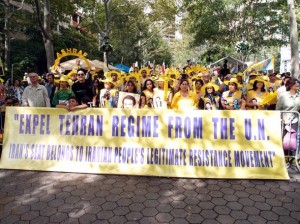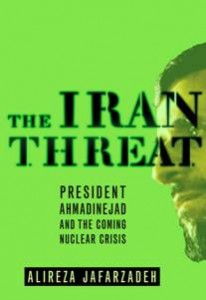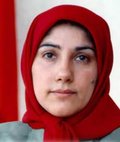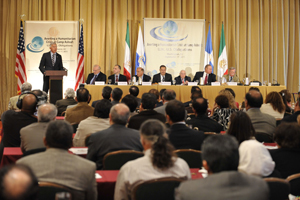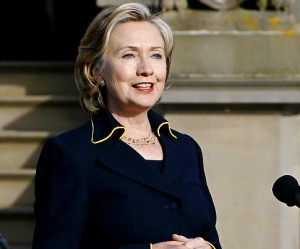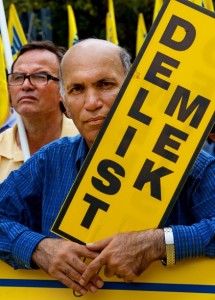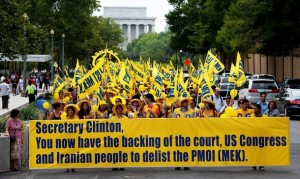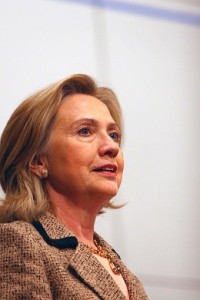THE ASSOCIATED PRESS
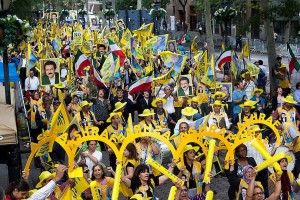
Demonstrators rally outside the UN headquarters to protest against controversial Iranian president Mahmoud Ahmadinejad before he is scheduled to speak at the UN General Assembly, Thursday, Sept. 22, 2011, in the Manhattan borough of New York. Former Homeland Security Secretary Tom Ridge and former UN Ambassador John Bolton were among the speakers at the event. (AP Photo/John Minchillo)
NEW YORK, (AP) — Former United Nations ambassador John Bolton said Thursday that the Obama administration is doing “almost nothing” to protect Iranians from the violence of their own regime — as represented at the U.N. by President Mahmoud Ahmadinejad.
Minutes before Ahmadinejad addressed the annual U.N. General Assembly, about 1,000 Iranian-Americans staged a protest rally in nearby Dag Hammarskjold Plaza.
Children stomped on a poster of Ahmadinejad among banners that covered the pavement. “Down With the Islamic Republic of Iran,” read one.
Bolton, who served as ambassador during George W. Bush’s presidency, told The Associated Press that the United States had failed to stop Iran from torturing and killing its own people.
“We expect that our commitment to the people of Iran is going to be upheld,” he said. “Right now, the Obama administration is doing almost nothing.”
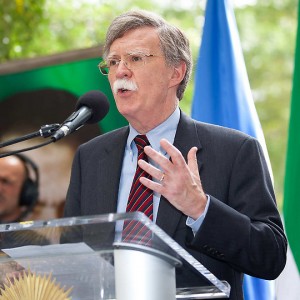
Former UN Ambassador John Bolton speaks to the crowds at an anti-Ahmadinejad rally outside the UN headquarters before the controversial Iranian president is scheduled to speak at the UN General Assembly, Thursday, Sept. 22, 2011, in the Manhattan borough of New York. (AP Photo/John Minchillo)
He said this week’s release of two American hikers held for years by Iran was what he called “just Broadway theater.”
Some protesters were draped in the Iranian flag, while others hoisted yellow flags representing Iran’s political opposition led by Maryam Rajavi, head of the Paris-based National Council of Resistance of Iran.
Protesters say tens of thousands of the opposition group’s supporters in Iran have been executed by the regime.
Speaking live from Paris via satellite on a giant television screen, Rajavi told the crowd that Ahmadinejad does not represent the Iranian people.
She urged the U.N. and the U.S. to stand with the Iranian people and their organized opposition, including more than 3,000 U.N.-defined refugees in Camp Ashraf in Iraq, which was attacked twice, with 47 killed and about 1,000 wounded.
“There is no doubt today that the United States has clearly abandoned its international obligations toward Camp Ashraf,” Rajavi said.
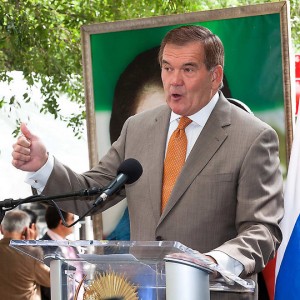
Former Homeland Security Secretary Tom Ridge speaks to the crowds at an anti-Ahmadinejad rally outside the UN headquarters before the controversial Iranian president is scheduled to speak at the UN General Assembly, Thursday, Sept. 22, 2011, in the Manhattan borough of New York. (AP Photo/John Minchillo)
While addressing protesters, former Homeland Security Secretary Tom Ridge said he agreed with Bolton that the U.S. government’s policy toward Iran is inadequate — especially in how it treats the MEK, or People’s Mujahedin of Iran that is the main component of Rajavi’s resistance group.
The U.S. State Department lists it as a terrorist organization, while supporters say the group opposes Ahmadinejad.
As the nation’s first head of homeland security after the Sept. 11, 2001, attacks, Ridge said he started every day with a list of potential threats against the United States.
“Never, not once, among hundreds and hundreds and hundreds of potential terrorist threats, did I ever see the MEK as a terrorist organization,” said Ridge, who also served under Bush. “It’s about time we took them off the list.”
That position was echoed by many of the protesters, including one group busy assembling cardboard rolls into a “cage” symbolizing the one that held former Egyptian President Hosni Mubarak at his trial. Inside was a man wearing a mask resembling Iranian Supreme Leader Ayatollah Ali Khamenei.
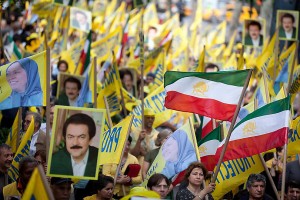
Demonstrators rally outside the U.N. headquarters to protest against controversial Iranian president Mahmoud Ahmadinejad before he is scheduled to speak at the U.N. General Assembly, Thursday, Sept. 22, 2011, in New York. Former Homeland Security Secretary Tom Ridge and former U.N. Ambassador John Bolton were among the speakers at the event. Demonstrators hold pictures of Massoud Rajavi, president of the National Council of Resistance of Iran, and his wife Maryam Rajavi. (AP Photo/John Minchillo)
“We hope that Khameini will be in a cage like this soon, to be tried for crimes against humanity,” said Farid Ashkan, 55, an Iranian-born New York dentist.
At the entrance to the plaza, a same-sex “wedding” was staged mocking the alliance of Syria and Iran. A protester posing as ousted Libyan leader Moammar Gadhafi presided over the ceremony, with yellow cake served to onlookers, representing the uranium used to make nuclear weapons.
Read more: http://www.sfgate.com/cgi-bin/article.cgi?f=/n/a/2011/09/22/national/a102622D80.DTL#ixzz1YoUmDyMN
